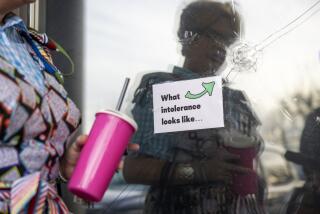Torn Asunder by 9/11
“Was there someone else?” a friend asked when I told her about my separation from my Moroccan-born husband. “Yes,” I said, without thinking. There were 19 other people, and they all hijacked planes and some of them flew into the Pentagon and the World Trade Center.
It’s not entirely accurate to say that the terrorist attacks of Sept. 11 caused the end of my marriage. But the horror of the falling towers and the profound cultural shifts the tragedy sparked caused an existing fracture in our relationship to become a chasm. Our leaders say we are not fighting a war of culture or religion, but in my household it became that.
We had tried hard to ignore our underlying cultural and religious tensions. But suddenly they became part of a public debate. As a Christian and a Muslim, and as an American and a Moroccan, we no longer had the luxury to push aside our differences and just be “us.” That September morning when I called out to my husband from the living room to tell him the awful news, he did not respond with disbelief or shock. He just audibly groaned, “Oh, no” -- flatly, with dread and with resignation. His dread was not just for the victims but for the damage the events would inflict on his religion. He immediately assumed these acts were perpetrated by extremist Muslims.
That day and in the weeks that followed the phone kept ringing. My husband was the only Muslim my friends and family knew, and they felt compelled to call. But to say what? It was strange to learn the attacks had brought my husband and me to mind. If was as if those who knew us felt that 9/11 had in some way happened to us.
People who never before had shown all that much interest in Islam became instant experts, suddenly wondering if my husband was Sunni or Shiite. “Tell him to be careful,” they told me nervously. But I somehow felt they were really warning me.
Years ago, when I announced my engagement, a Jewish friend told me I would eventually change my religion. “Believe me, you will convert,” he said. But falling in love in secular America means you follow the “I” and not the “us.” I didn’t think I had to love his religion or his country of origin. In retrospect, I didn’t think that I needed to love my own. My job, I told myself, was simply to love him. As for his faith, his prophet and the rug in the living room upon which he prayed, I didn’t see how they could harm our love. We both agreed there was only one God, so how could it be bad that he prayed five times more each day than I did?
The challenges of marrying someone whose country, first language, culture and religion are not your own are well documented, but living in Los Angeles, I am surrounded by the triumph and momentum of intermarriage. People of every culture, religion, ethnicity and class have come together here, married and had children -- creating a larger vision and understanding where there wasn’t one before. In this country, we celebrate those who ignore the confines of difference in the pursuit of love. This is a story we applaud, even when it ends in tragedy.
I do not know in any way the grief and terror of those who experienced first-hand the events of 9/11. But beyond the horror and sadness I felt for the victims, I was also scared for my husband and my marriage. I was fearful that anti-Arab and anti-Muslim sentiment would grow and begin to snowball. I began to think about children, children we did not even have. I imagined them being harassed, threatened or ostracized. Already a minority in America and the granddaughter of Mexican immigrants, I began to feel anxious. Being married to a Muslim now seemed tantamount to receiving an ethnic and social demotion, as if suddenly people were asking me to sit in the back of the bus.
Anticipating hate crimes, I asked my husband not to go to the mosque. I asked him not to speak Arabic in public. Fearing for their safety, I wanted him to stop meeting his Muslim friends for coffee. In the weeks that followed I commiserated with friends and co-workers. Like everyone else, I was on edge expecting more attacks on the United States. Maybe Los Angeles was next. But while everyone worried about future attacks, no one around me could share the personal anxiety I had for my husband’s safety. It also hurt me that his religion, so dear to him, was being maligned. I did not know how anxious I was until soon after the attacks: When I heard that President Bush had broken fast during the Islamic holy month of Ramadan with Muslims at the White House, I wept at my desk out of relief and gratitude.
We were happy to see the support people in Los Angeles and across the country extended to Muslims. I remember how encouraged my husband was to see that the Koran was being sold in unprecedented numbers. But he was also conflicted. After 9/11, everyone, including me, expected him to explain Wahhabism, jihad and terrorism. “Why, after all this time, do you only now want to know about Islam?” he asked. The sudden interest put him on the defensive. Before the attacks, my husband had felt that the United States was one of the few places where Islam could be practiced the way he believed it was intended to be. But after 9/11, he started to believe that, as a Muslim, he would never be accepted here.
It turns out that my husband never suffered the harassment I feared, but the damage was done. He felt he could never get a job as an airline mechanic, which was what he had been studying to be before the attacks. After a short pause, he resumed his trips for coffee and to the mosque. He continued speaking Arabic in public. His connection to his faith and his fellow Muslims was never stronger.
In truth, America did not wind up rejecting my husband. I did.
I began to rethink our agreement to raise our children Muslim. He started to talk about going home. He wanted me to know the Koran. I was considering revisiting my Catholic roots. He thought love meant that I would begin to embrace Islam because the events now called for it. I thought it meant that we could still both worship God in our own way.
In the pre-9/11 world there was a space for us that was big enough to love and be married in, to blend our differences with optimism and fearlessness. Now those differences seem unbridgeable.
I know there are many couples who have found a way to move forward together regardless of their differences. But I no longer believe that love conquers all. Love consists of compromises, and with the world so deep in conflict, compromising on the big things, like religion, seems harder now than ever before.
More to Read
Start your day right
Sign up for Essential California for news, features and recommendations from the L.A. Times and beyond in your inbox six days a week.
You may occasionally receive promotional content from the Los Angeles Times.






